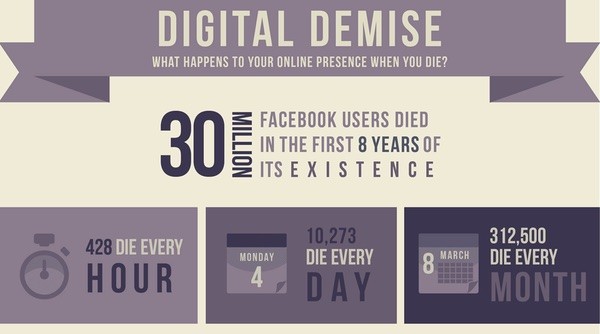
Update: I first pitched this series to Tuts+ because I thought it was an interesting, under-reported topic. After completing the first two episodes, I learned that I had a treatable, operable, likely benign brain tumor which will require surgery. My prognosis is very good, but those first few days were intermittently terrifying and poignant—the topics explored in this series became very real to me overnight. I hope you'll take my experience to heart, read mindfully, and consider taking action to get your shit together. Please also check out my personal essay: What We Can Learn From My Brain Tumor. Enjoy the series.
This is the second of a series on exploring the complexity of managing your digital legacy. If you'd like, go back and read part one, Hosting Your Website After Death. In this episode, I'll share with you what you should do to prepare your digital legacy prior to a health emergency or your death.
Just a reminder, I do participate in the comment threads below. If you have a question or want to suggest a future topic, please post a comment below. You can also reach me on Twitter @reifman or email me directly.
Get Your Shit Together
After my friend Chanel Reynold's husband José died in a tragic cycling accident, she had the inspiration for Get Your Shit Together (GYST):
It took her several years to grieve and put her family's life back on track enough to the point where she could focus on helping others. In A Shocking Death, a Financial Lesson and Help for Others, she told the New York Times:
I was finding it really hard for me to stay present and in the room and to be able to hear what the doctors were saying because I was so overwhelmed with not knowing how much money we had in our checking account, and the fact that we had our wills drafted but not signed.
Check it out—GYST provides helpful checklists to make emergency preparedness easier. While its lists address wills, living wills, life insurance and personal loose ends, it only makes passing mentions of passwords.
Facing the Inevitable
A counselor of mine used to say, "No one's getting off this planet alive." While the Mars One folks are trying to change that, it's probably true for most of us. Hopefully you'll have the time you need to plan your affairs. But what if you face a sudden health emergency where you're temporarily incapacitated, or a partner or family member dies unexpectedly?
Even Facebook Users Die
An Australian life insurance company produced this intriguing advertisement, What Happens Online When You Die, saying that three Facebook users die every minute and reminding us of the privacy concerns our digital death presents:
Last June, WebpageFX created a super useful infographic, What Happens to Your Online Presence When You Die?

Since I stopped using Facebook a couple of years ago, I was particularly amused by the estimate that not too long from now there will be more dead users of Facebook than living ones. I'm sure Facebook will find a way to market the dead to advertisers and I'm glad I won't be part of that.

The Digital Beyond
Perhaps Facebook will try to market its knowledge of the dead to our vulnerable descendants, as depicted in the brilliant Black Mirror series, Be Right Back:
The Digital Beyond is a website that reports on issues related to our digital afterlife. It's an excellent starting point for anyone interested in learning more. You can also listen to one of my favorite journalists, Brooke Gladstone, interview Evan Carroll, one of the bloggers behind the site: Our Digital Afterlives.
In fact there's been a lot of good media coverage of these topics. PBS NewsHour offered: Dead and online: What happens to your digital estate when you die?:
and The New York Times Magazine provided, Cyberspace When You're Dead.
What You Should Prepare
Here's a high-level list of what you should prepare to provide your family members in a safe, secure manner.
Credentials to Critical Accounts
In addition to all of the GYST checklists, you should provide access to critical credentials and accounts such as PINs for your ATM, credit cards and home alarm master, device passwords for phones, laptops and desktop computers (and firmware passwords), and password storage software (e.g. 1Password).
If you have any public keys or perhaps SSH keys for managing your website, these need to be provided as well—with documentation.
Email, the Gateway Account
Of course you should provide access to critical email accounts. As third party authentication services become more commonplace, certain services are becoming lynchpins to many other services. For example, your Google account can log you in to a variety of other services. Provide a list of the linked accounts.
Keep in mind that there may be materials you don't wish to share. For example, your Google account provides access to all of your emails and Google Drive files. It's useful to think about segmenting private materials ahead of an emergency, e.g. using a separate email account for messages you wish to remain private forever.
There are legacy services such as Capsoole, which we'll discuss below, that make it possible to delete private content from these accounts posthumously. My app Simplify Email can regularly expire (delete) messages from specific senders or in specific folders. See Building Advanced Email Features With IMAP and PHP (Tuts+).
There are also services that allow you to posthumously send emails. These can deliver credentials but they can also be social. For example, maybe you want to send birthday messages to your children annually after you pass on. These services activate by means of a dead man switch.
Social Media
Who knows what social media will look like in the future? Recently Boing Boing featured Killing Time At LightSpeed, an intriguing, fun look at social media in 2042.
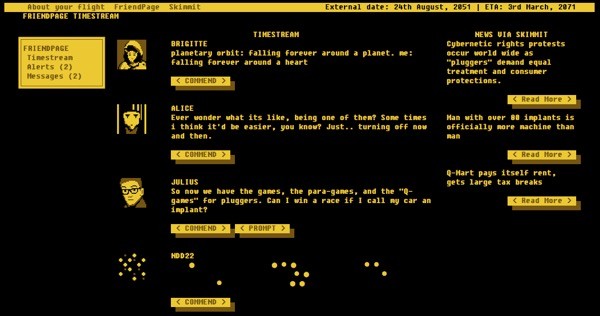
Make yourself familiar with the policies of the services you participate in. WebpageFX's What Happens to Your Online Presence When You Die? is very helpful for this.
Think ahead about what you would like to happen to your social accounts, and then be specific with instructions and provide the credentials necessary for your descendants to act appropriately.
Digital Assets: Blogs, Photography, etc.
In part one, Hosting Your Website After Death, I reviewed how difficult it is to plan for web hosting after you're gone. I think the best approach is to provide clear wishes and thorough instructions for your descendants on what you'd like to be done with your online assets. It's probably also useful to set aside funding for them to pay the bills. Don't count on anything being preserved more than ten years without a lot of guidance and attention.
Digital Legacy Services
There are a number of emerging services to help manage our digital assets in case of emergency or death. But many of these are small businesses or startups. I question how secure, reputable and reliable these companies are.
In many cases, their business model is built around their customers storing credentials to vital accounts. This makes them a perfect target for hackers.
In the past year, my Fortune 500 financial services company and health insurer were both hacked, requiring them to agree to purchase identity theft services for all of their members. Do we really expect digital afterlife startups to be better at security than these companies?
What if hackers were able to obtain keys to all of my accounts by hacking into a legacy service? What if they did it after I passed on?
For the moment, I'd be very cautious what you use these services for.
There's an alphabetical Online Services List at The Digital Beyond which provides a useful reference. Just be cautious. Many of the businesses are already defunct:
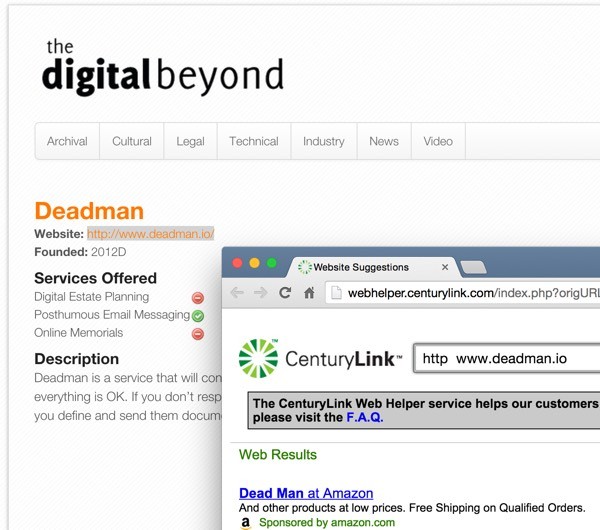
Here's another dead man service promoted in Slashdot that's passed on:
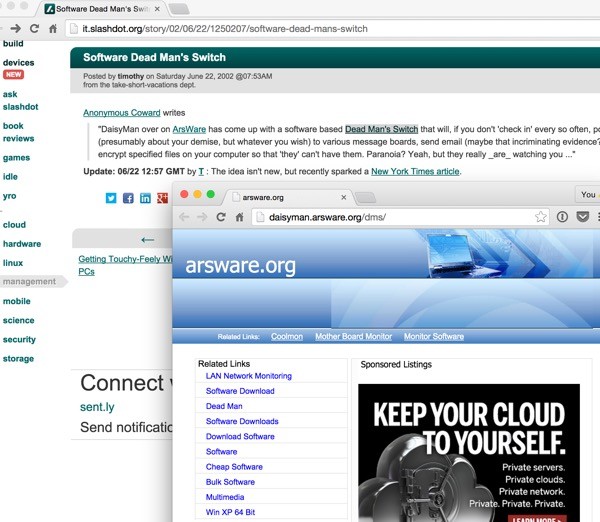
My recommendation is only to use services that let you encrypt your cloud-based archive with your own password-protected private key which they don't have access to.
For now, a "simple" DIY solution would be to store your own encrypted document at Dropbox or another cloud provider and provide your family member with local access to decryption keys. Or provide your family members with a semi-secret location of the encrypted archive, and host the decryption keys with a dead man switch or legacy service (or two).
Emerging Services
Here are a few emerging services that you may want to check out. Perhaps I will explore these more in future episodes:
PasswordBox
PasswordBox, which acquired Legacy Locker. Keep in mind acquisitions are a primary transition point at which the best plans of your digital legacy can be compromised by someone else's profit model.
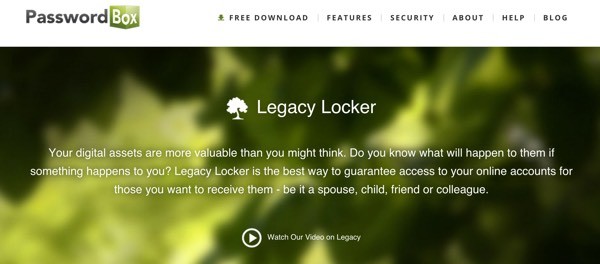
Capsoole
Capsoole asks for access to all of your accounts so you can pre-program privacy controls that delete sensitive materials. In the meantime, cross your fingers they don't get hacked.
Here's an example of Capsoole requesting access to my life on Google:

Right about here is where you should be having second thoughts:

Dead Man's Switch
Dead Man's Switch (DMS) was profiled in that On the Media segment above. They encourage you to use it to send both credentials as well as social emails in your digital afterlife.
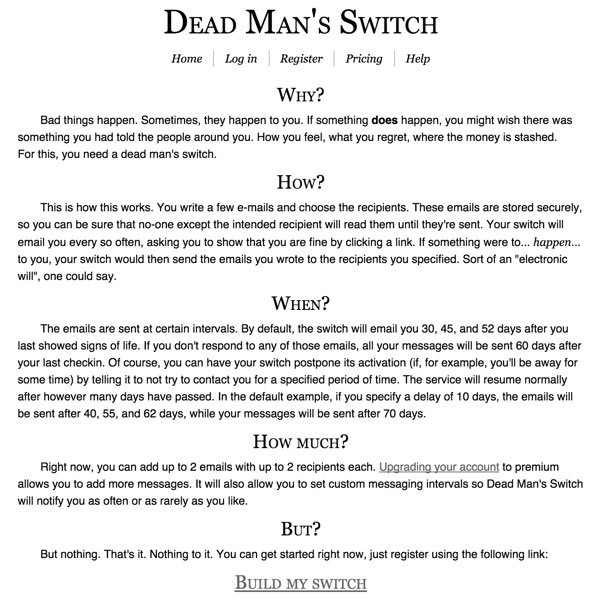
Personally, I found the $20 lifetime price too cheap to believe in. I'd almost rather they charge me $1,000. That would be more reassuring.
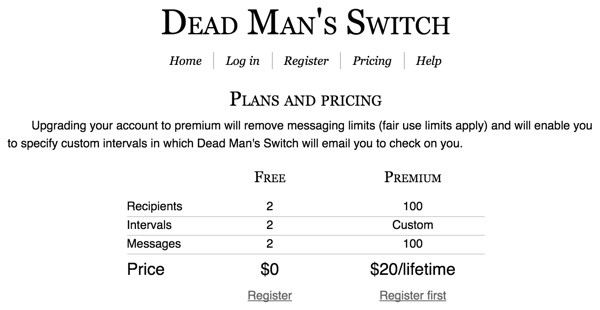
Neither did the site make me feel comfortable that they are capable of robustly securing my credentials in cold storage.
I think it's wise to remember that all of these business could be hacked (some may even be funded covertly by the NSA) and it's unlikely any of them will be around in ten years. Keep that in mind and then plan accordingly.
What's Next?
Well, it looks like you've survived the first two episodes of our series about preparing for your death online. I hope you've found it entertaining and useful thus far. Depending on feedback from readers, we may offer more tutorials in this area. Let us know what you want to learn more about. We welcome feature and topic requests. You can post them in the comments below or email me at my Lookahead Consulting website.
If you'd like to know when the next tutorial arrives, follow me @reifman on Twitter or check my instructor page.
Related Links
- Hosting Your Website After Death (Tuts+)
- What We Can Learn From My Brain Tumor (Jeff Reifman)
- Get Your Shit Together
- The Digital Beyond
- Dead Mans Switch
- Capsoole
- What Happens to Your Online Presence When You Die? (Infographic)
-
Dead and online: What happens to your digital estate when you die? (PBS News Hour)
- Cyberspace When You're Dead (New York Times Magazine)
- Dave Winer's Future-Safe Archives


Comments